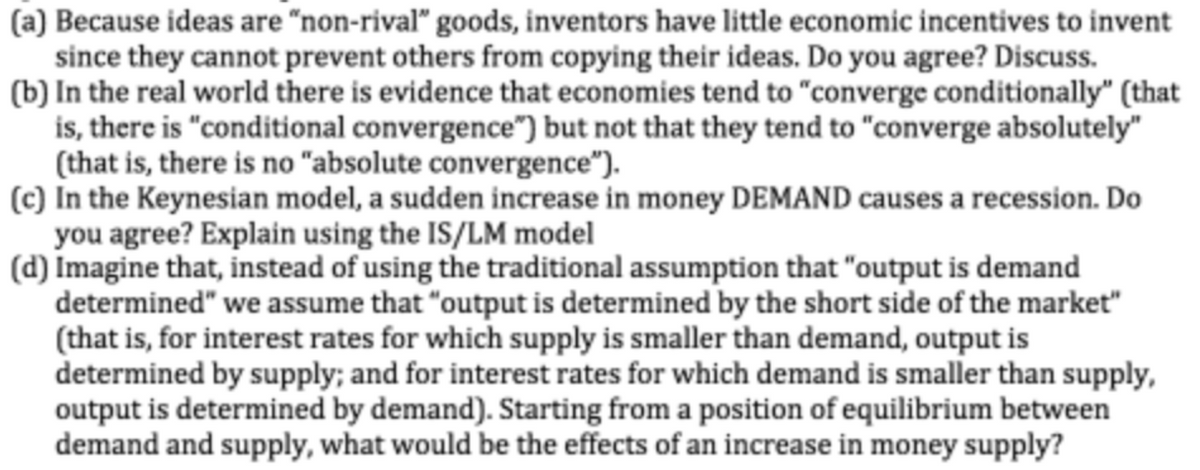Principles of Economics 2e
2nd Edition
ISBN:9781947172364
Author:Steven A. Greenlaw; David Shapiro
Publisher:Steven A. Greenlaw; David Shapiro
Chapter20: Economic Growth
Section: Chapter Questions
Problem 12SCQ: Why dues productivity growth in high-income economies not slow down as it runs into diminishing...
Related questions
Question

Transcribed Image Text:(a) Because ideas are "non-rival" goods, inventors have little economic incentives to invent
since they cannot prevent others from copying their ideas. Do you agree? Discuss.
(b) In the real world there is evidence that economies tend to "converge conditionally" (that
is, there is "conditional convergence") but not that they tend to "converge absolutely"
(that is, there is no "absolute convergence“).
(c) In the Keynesian model, a sudden increase in money DEMAND causes a recession. Do
you agree? Explain using the IS/LM model
(d) Imagine that, instead of using the traditional assumption that "output is demand
determined" we assume that "output is determined by the short side of the market"
(that is, for interest rates for which supply is smaller than demand, output is
determined by supply; and for interest rates for which demand is smaller than supply,
output is determined by demand). Starting from a position of equilibrium between
demand and supply, what would be the effects of an increase in money supply?
Expert Solution
This question has been solved!
Explore an expertly crafted, step-by-step solution for a thorough understanding of key concepts.
Step by step
Solved in 2 steps

Knowledge Booster
Learn more about
Need a deep-dive on the concept behind this application? Look no further. Learn more about this topic, economics and related others by exploring similar questions and additional content below.Recommended textbooks for you

Principles of Economics 2e
Economics
ISBN:
9781947172364
Author:
Steven A. Greenlaw; David Shapiro
Publisher:
OpenStax

Principles of Economics (MindTap Course List)
Economics
ISBN:
9781305585126
Author:
N. Gregory Mankiw
Publisher:
Cengage Learning

Essentials of Economics (MindTap Course List)
Economics
ISBN:
9781337091992
Author:
N. Gregory Mankiw
Publisher:
Cengage Learning

Principles of Economics 2e
Economics
ISBN:
9781947172364
Author:
Steven A. Greenlaw; David Shapiro
Publisher:
OpenStax

Principles of Economics (MindTap Course List)
Economics
ISBN:
9781305585126
Author:
N. Gregory Mankiw
Publisher:
Cengage Learning

Essentials of Economics (MindTap Course List)
Economics
ISBN:
9781337091992
Author:
N. Gregory Mankiw
Publisher:
Cengage Learning

Principles of Economics, 7th Edition (MindTap Cou…
Economics
ISBN:
9781285165875
Author:
N. Gregory Mankiw
Publisher:
Cengage Learning

Brief Principles of Macroeconomics (MindTap Cours…
Economics
ISBN:
9781337091985
Author:
N. Gregory Mankiw
Publisher:
Cengage Learning